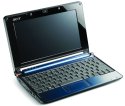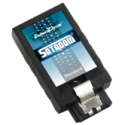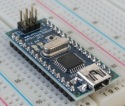Mini-notebook runs “Windows friendly” Linux
June 4, 2008 [Updated Jun. 4] — 3K Computer is shipping a $300 ultra-mini PC notebook that runs “Genuine CE” Linux distribution from a 4GB SSD (solid-state disk). 3K's RazorBook 400-Mini-Notebook uses a 32-bit RISC-based processor from Chinese processor start-up Ingenic. (more…)
[Updated Jun. 4] — 3K Computer is shipping a $300 ultra-mini PC notebook that runs “Genuine CE” Linux distribution from a 4GB SSD (solid-state disk). 3K's RazorBook 400-Mini-Notebook uses a 32-bit RISC-based processor from Chinese processor start-up Ingenic. (more…)
 Linpus Technologies announced it will join Intel's “Moblin” Linux project, aimed at developing software for low-cost notebooks based on Intel Atom processors. The mature Linux distributor says its “Linux Lite” distribution runs 20 percent longer under batteries when using software developed…
Linpus Technologies announced it will join Intel's “Moblin” Linux project, aimed at developing software for low-cost notebooks based on Intel Atom processors. The mature Linux distributor says its “Linux Lite” distribution runs 20 percent longer under batteries when using software developed…  Intel has announced a second wave of Atom processors, targeting simple desktops and notebooks the chipmaker dubs “nettops” and “netbooks.” The Atom N270 and 230 processors are accompanied to market by matching 945GSE and 945GC chipsets and low cost SSDs (solid state drives).
Intel has announced a second wave of Atom processors, targeting simple desktops and notebooks the chipmaker dubs “nettops” and “netbooks.” The Atom N270 and 230 processors are accompanied to market by matching 945GSE and 945GC chipsets and low cost SSDs (solid state drives).  Intel has announced a low-cost, NAND-flash-based SSD (solid state drive). The Z-P230 uses a parallel ATA (PATA) interface to save power in mobile devices, and sells for $25 in a 4GB version, or $45 for 8GB. A 16GB version will be available in the fourth quarter.
Intel has announced a low-cost, NAND-flash-based SSD (solid state drive). The Z-P230 uses a parallel ATA (PATA) interface to save power in mobile devices, and sells for $25 in a 4GB version, or $45 for 8GB. A 16GB version will be available in the fourth quarter.  The world's third-largest PC vendor has announced a “netbook” based on a 1.6GHz Intel Centrino Atom processor and Linpus Linux. Acer's $380 Aspire One offers 512MB or 1GB of RAM, 8GB flash, an 8.9-inch, 1024×600 display, WiFi, webcam, and an optional 80GB hard drive.
The world's third-largest PC vendor has announced a “netbook” based on a 1.6GHz Intel Centrino Atom processor and Linpus Linux. Acer's $380 Aspire One offers 512MB or 1GB of RAM, 8GB flash, an 8.9-inch, 1024×600 display, WiFi, webcam, and an optional 80GB hard drive.  InnoDisk has announced what it touts as the world's smallest SSD (solid state drive) with a Serial ATA (SATA) interface. Adapting the typical IDE module to SATA's smaller connector, the “Satadom” needs no separate power cabling, features a locking connector, and targets harsh environments, says InnoDisk.
InnoDisk has announced what it touts as the world's smallest SSD (solid state drive) with a Serial ATA (SATA) interface. Adapting the typical IDE module to SATA's smaller connector, the “Satadom” needs no separate power cabling, features a locking connector, and targets harsh environments, says InnoDisk.  Shenzhen, China-based smartphone design company Tranzda Technologies is marketing five phone designs that use its NewPlus Linux phone application stack. All five Tranzda designs include GPS, along with optional features that include WiFi, cameras, and biometric fingerprint authentication.
Shenzhen, China-based smartphone design company Tranzda Technologies is marketing five phone designs that use its NewPlus Linux phone application stack. All five Tranzda designs include GPS, along with optional features that include WiFi, cameras, and biometric fingerprint authentication.  The Arduino Project has announced a new compact version of its open source Arduino microcontroller platform called the Arduino Nano. Meanwhile, winners of the Arduino Open Hardware Contest have been announced, and include a security system, a modular robot, and a sweater-clad haptic navigational device.
The Arduino Project has announced a new compact version of its open source Arduino microcontroller platform called the Arduino Nano. Meanwhile, winners of the Arduino Open Hardware Contest have been announced, and include a security system, a modular robot, and a sweater-clad haptic navigational device.